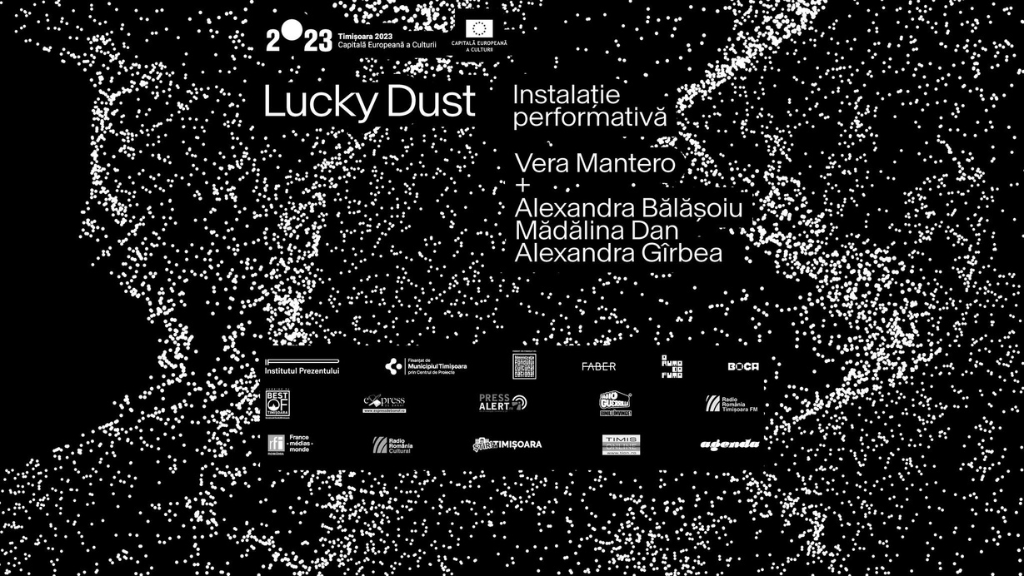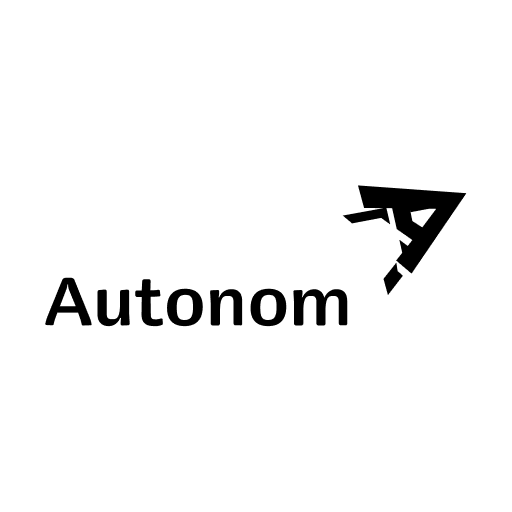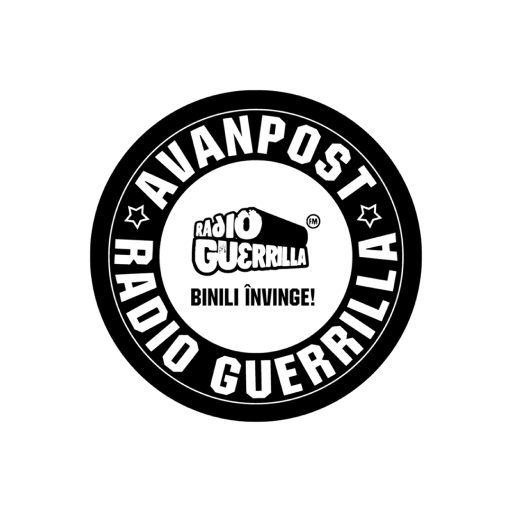LUCKY DUST
performative installation
October 28 & 29, 2022
visiting hours: 12:00–17:00
performance hours: 17:00 & 19:30
reservations: https://forms.gle/AVEa7MQJWYCBSrx76
FABER
Splaiul Peneș Curcanul 4-5
Timișoara
IP—The Institute of the Present presents the Romanian-Portuguese co-production LUCKY DUST as part of the “Uncensored Act” project in Timișoara in the form of a performative installation which will be activated in the FABER exhibition space on October 28 and 29. For the performative events, access is by reservation within the limit of 30 participants per session, on October 28 and 29, from 17:00 and from 19:30. The duration of the event, composed of a performance and a film projection, is of approximately two hours.
___
We can only observe the past. In each and every moment the present we are inhabiting becomes the past for somebody else. The same can be said in relation to the way our gaze meets the immensity of the universe or the personal histories. The distance travelled by the gaze to meet its object turns everything into past.
How is history becoming movement, how is a theme or an interest becoming movement, what can be uttered through movement and what procedures to use are the issues at the core of the working process of the LUCKY DUST project.
Triggered by a selection writings and performances of the Portuguese choreographer Vera Mantero, dating mainly from the late 1980s and the 1990s, together with several later connected works, and based on a research and framework conceived by Ștefania Ferchedău, three solos have been created by the Romanian artists Alexandra Bălășoiu, Mădălina Dan and Alexandra Gîrbea together with Vera Mantero. An internal ecology of the artistic team, founded on companionship in creation, intensification and contamination of compositional themes and protocols, inspired a variety of individual crossings between the artists, who incorporated Vera Mantero’s writings, practices, and experiences, alongside their own, in the solos. The LUCKY DUST ecosystem reveals itself in a hybrid installation joining performative moments with a collection of writings and videos from Vera Mantero’s archive and audio recordings from the present solos, together with the intersected timelines of the four artists and the political and cultural contexts in which they have been living.
Several recordings of the original works by Vera Mantero quoted by Alexandra Bălășoiu, Mădălina Dan and Alexandra Gîrbea may be consulted on the video screens in the installation, together with the documentary “Let’s talk about it now,” 1999, by Margarida Ferreira de Almeida, recorded during the Culturgest retrospective of Vera Mantero’s work from 1989 to 1989. The documentary will be presented together with the solos as part of the performance event in the installation.
The reference works are: “Perhaps she could dance first and think afterwards,” 1991, solo; “For bored and profound sadnesses,” 1994, group piece; “The Dance of Existing,” 1995, solo; “Eating your heart out,” by Rui Chafes and Vera Mantero, 2004, solo; “What can be said about Pierre,” 2011, solo; “The Clean and the Dirty,” 2016, group piece.
“A body is what we are in the world.
Then there’s a number of things we can do and which can project us out of our bodies. But we cannot leave our body temporarily, we cannot do so until a pain passes, for example. No one can get rid of their body; we cannot exist beyond our body. It is as if there really was a destiny, a corporeal destiny: everything that will happen in our body that we cannot control, be it good or bad, is our destiny.” (Vera Mantero, My Body and the Body of Other People, 1988)
___
Choreographer, performer, researcher and thinker, Vera Mantero (b. 1966, Lisbon) is a major reference in contemporary dance. Her working process is similar to that of an archaeologist or astronomer whose gaze goes deep beyond the surface of the world to search, to find sparkling links, to decode them, while having the body as an instrument of experimentation. She uses writing as a medium to reflect on her work, to generate new ideas and to thoroughly capture a present that slips away. Her artist notebooks, starting from the mid-1980s and until early 2000s, uncover the route she took to condense her practice in a composition scheme which is, at the same time, concrete, poetical and philosophical in its dimensions. Vera Mantero’s work was a reference to the emerging Romanian dance scene in the 1990s and was later shown in Bucharest in 2007, and in Timișoara in 2021.
Alexandra Bălășoiu (b. 1989, Pitești) began her path in contemporary dance in the early 2010s, after taking a degree and briefly working in the field of Aerospatial Engineering. Her search for a concrete approach towards exploring the universe and space-time thus transferred to an intimate choreography aimed first at embodying knowledge and changing inner landscapes. Alexandra has many talents and interests and an overflow of energy that pushes her to follow these by constantly reversing perspectives. Her bags are filled with noise and she finds enthusiasm in experimental research on the relationship between dance and sound/music, but also in blending text and movement towards scouting and revealing the invisible through her dance.
Mădălina Dan (b. 1980, Ploiești) is an established choreographer and performer who moved towards contemporary dance in the early 2000s, creating her own choreographies since 2007. Living in between places, cities and countries, she is preoccupied with the limitations to systematically documenting, collecting and self-historicising her work, while always carrying inside an imperceptible patrimony and walking with it everywhere. Drawn towards connecting art and life, she employs various protocols to navigate personal archives and understand how past impacts the present. She finds poetry in the precision and concreteness of life and unexpected humour and irony often pervade her dances. In her recent work, Mădălina Dan is interested in testing the tactile as an escape from the visible to the invisible realm of the subjective and affective body-reality.
Alexandra Gîrbea (b. 1986, Brad) lives in a world of words. As a child she dreamt of becoming an actress and traveller, thus making her way in the world through words. Her studies led her on a path going from more abstract interests (she followed first a communication degree, then a MA in performing arts theory) to rather more concrete solutions of building a new life through dance. In order for the dance to happen for her, she feels the necessity to accumulate and intensify words in speech or in writing. She frees herself of the need for certainty, and she transforms accidental words in instant poetry and performs them through the tiniest gestures. Alexandra finds purpose and meaning in contemplating the world through movement.
___
LUCKY DUST
performative installation
Based on an idea, practices, works and writings by: Vera Mantero
Performance co-creation: Vera Mantero with Alexandra Bălășoiu, Mădălina Dan, Alexandra Gîrbea
Concept, research and artistic direction: Ștefania Ferchedău
Choreography & performance: Alexandra Bălășoiu, Mădălina Dan, Alexandra Gîrbea
Co-creation & rehearsal assistant: Mário Afonso
Set design: Andrei Dinu
Sound & stage manager: Alexandros Raptis
Visual identity: Daniel & Andrew Studio (Andrei Turenici)
Translations and editing: Alina Șerban, Diana Bularca, Claudia Lie
Production team RO: Ștefania Ferchedău, Cosmin Manolescu
Production team PT: Cátia Mateus, Rita Monteiro
Acknowledgments: Cristina Potra-Mureșan, Ezequiel Santos, Vera Santos, Oana Simionescu, Teo Papadopol, Attila Erdei, Alex Todirică, Rudy Teianu
Producer: The Institute of the Present
Co-producers: O Rumo do Fumo, BoCA Biennial of Contemporary Arts
Production set design elements: Studio Citadelle, Timișoara
Working spaces: AREAL/ Bucharest, Espaço da Penha—O Rumo do Fumo, Forum Dança / Lisbon, House of Youth & FABER/ Timișoara
Local support: Polo Cultural Gaivotas, Lisbon
Funders: Produced in the frame of the projects “Uncensored Act” and “Time Exposure: Movement Notebooks.” The project is part of the “Cultural Programme Timișoara 2023—European Capital of Culture” and is funded by the City of Timișoara through the Center for Projects. Cultural project co-funded by the Administration of the National Cultural Fund.
O Rumo do Fumo is supported by República Portuguesa—Cultura | DGArtes—Direcção Geral das Artes.
Media partners: Radio Guerilla, RFI România, Radio România Cultural, TVR Timișoara, Radio Timișoara, Tion.ro, Agenda, Press Alert, Express de Banat, Dumbrăvița TV, Știri de Timișoara, Best of Timișoara, TeleU
___
IP—The Institute of the Present is a research and an artist and theory resource platform in the field of visual and performing culture conceived by Ștefania Ferchedău and Alina Șerban, established in Bucharest.
The “Uncensored Act” programme dwells on the idea of community, collective action, collaboration and solidarity in the spirit of shared values, with a route that is triggered by the history of Timișoara in the 1989 context, connected regionally and internationally through the proposed artistic content.
The project does not necessarily represent the standpoint of the Administration of the National Cultural Fund. AFCN cannot be held liable for the content of the project or the manner in which the outcomes of the project may be used. These shall devolve entirely on the beneficiary of the financing.
Contact: ip@institutulprezentului.ro, www.institutulprezentului.ro











